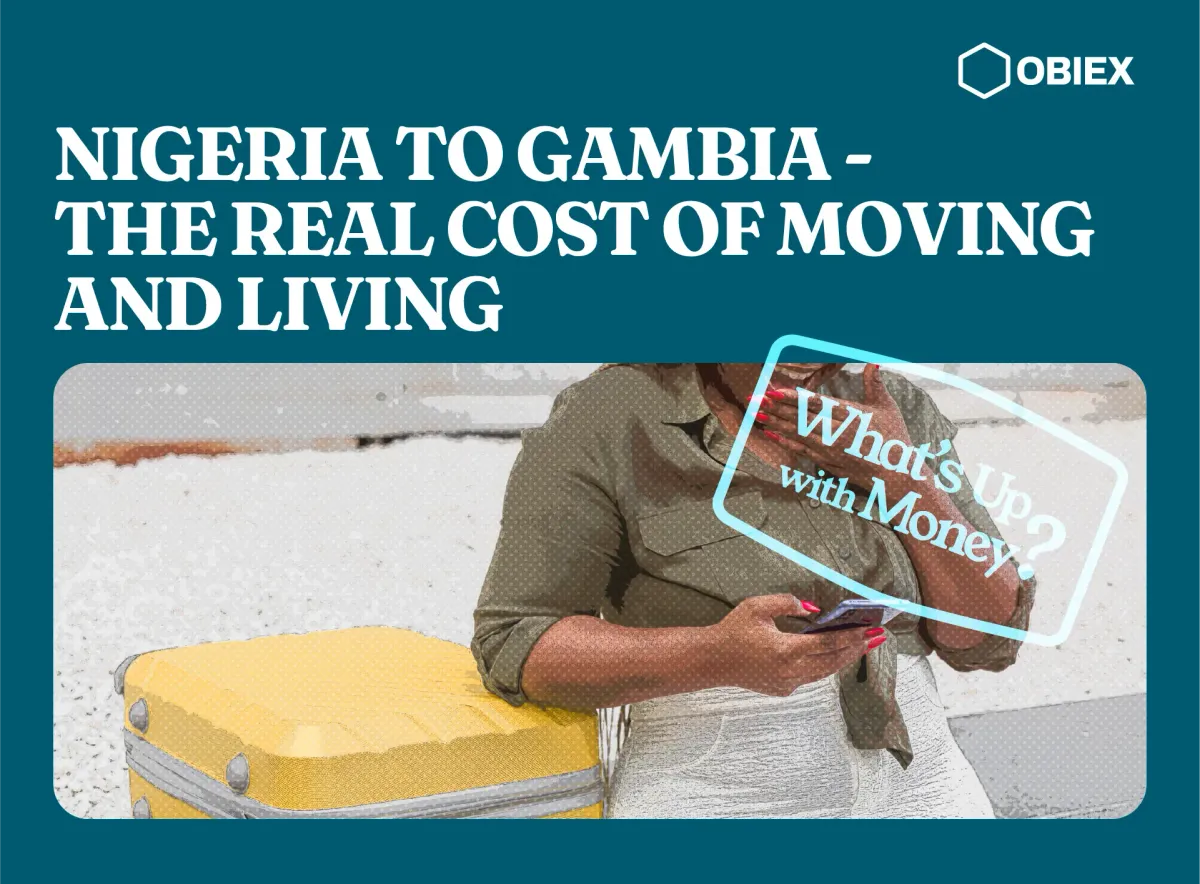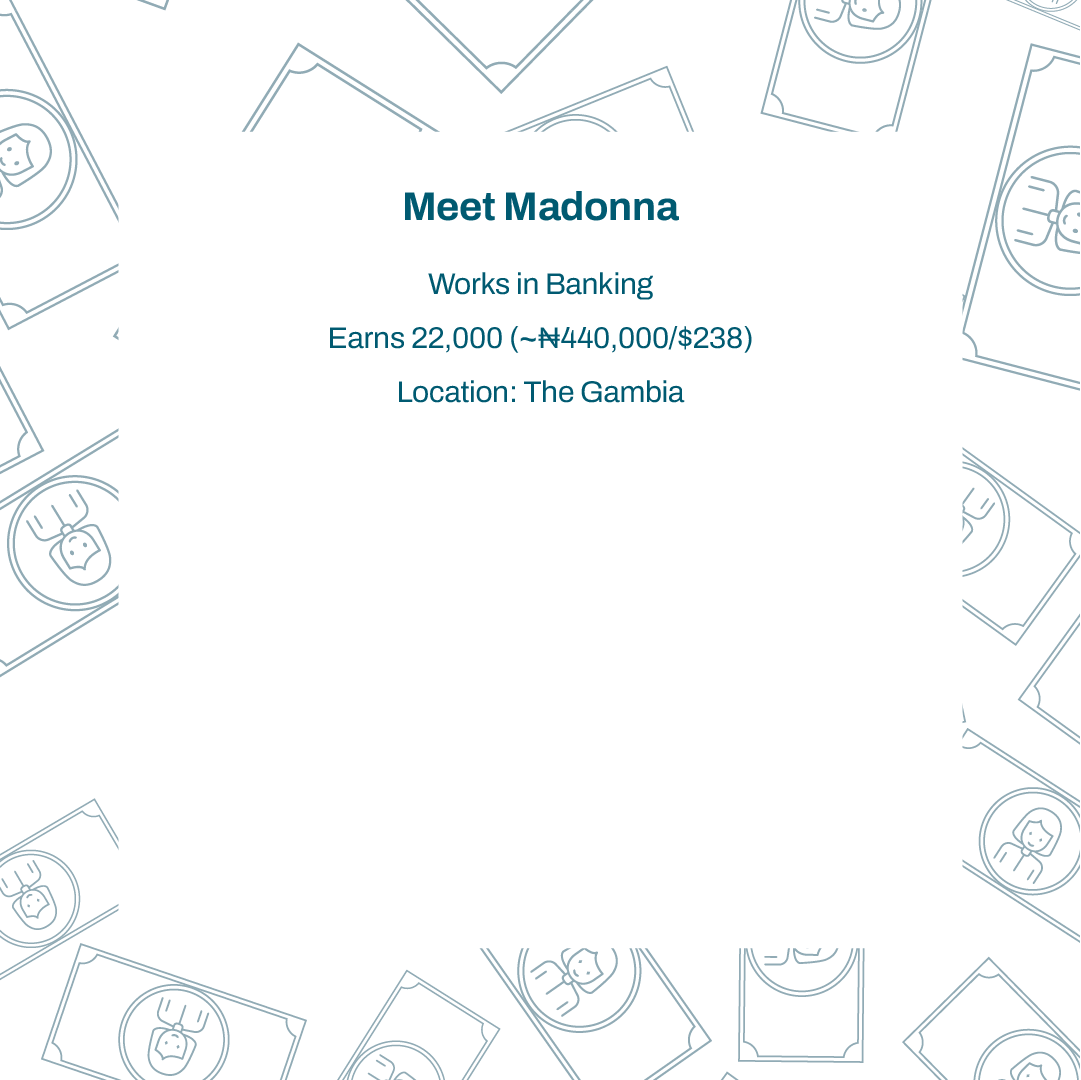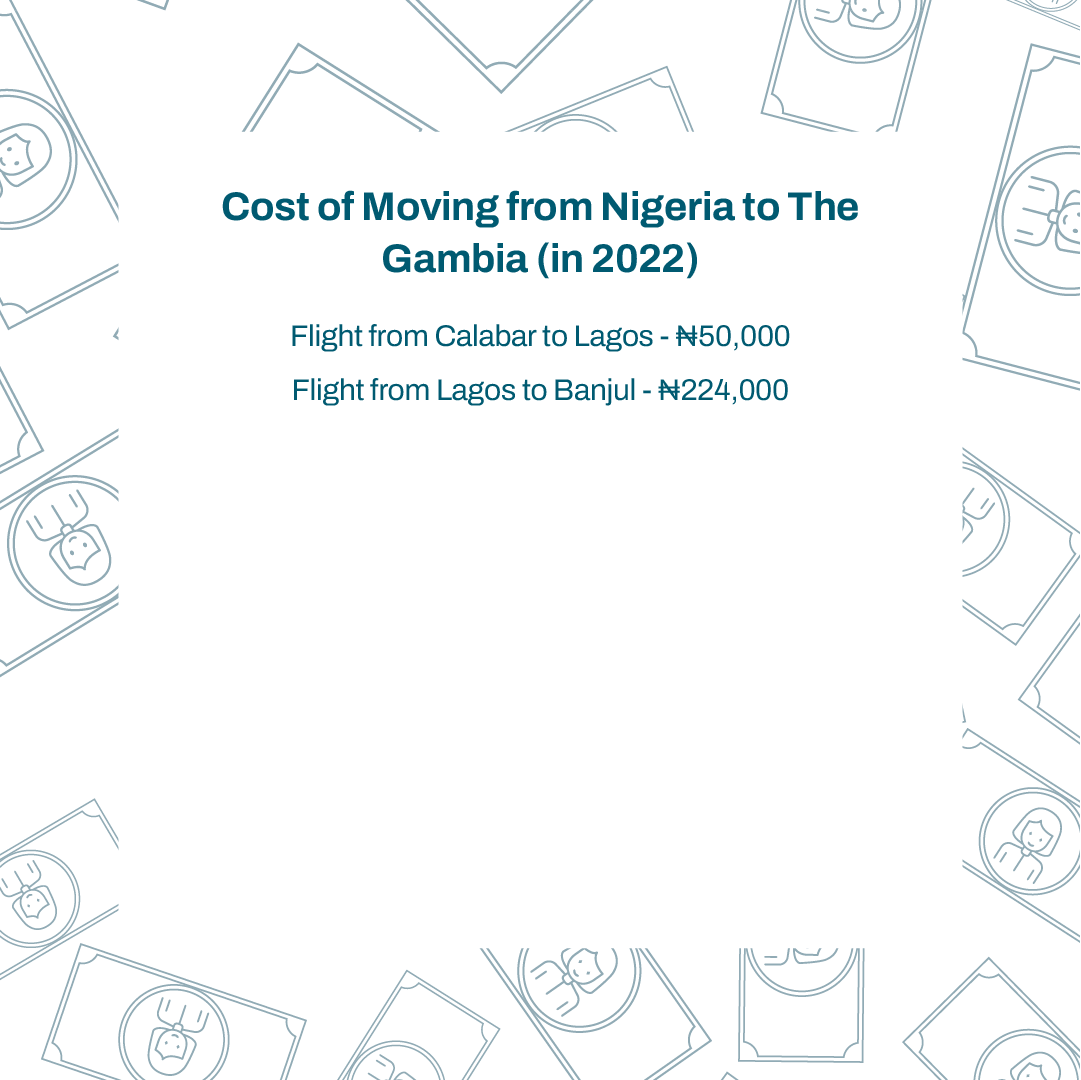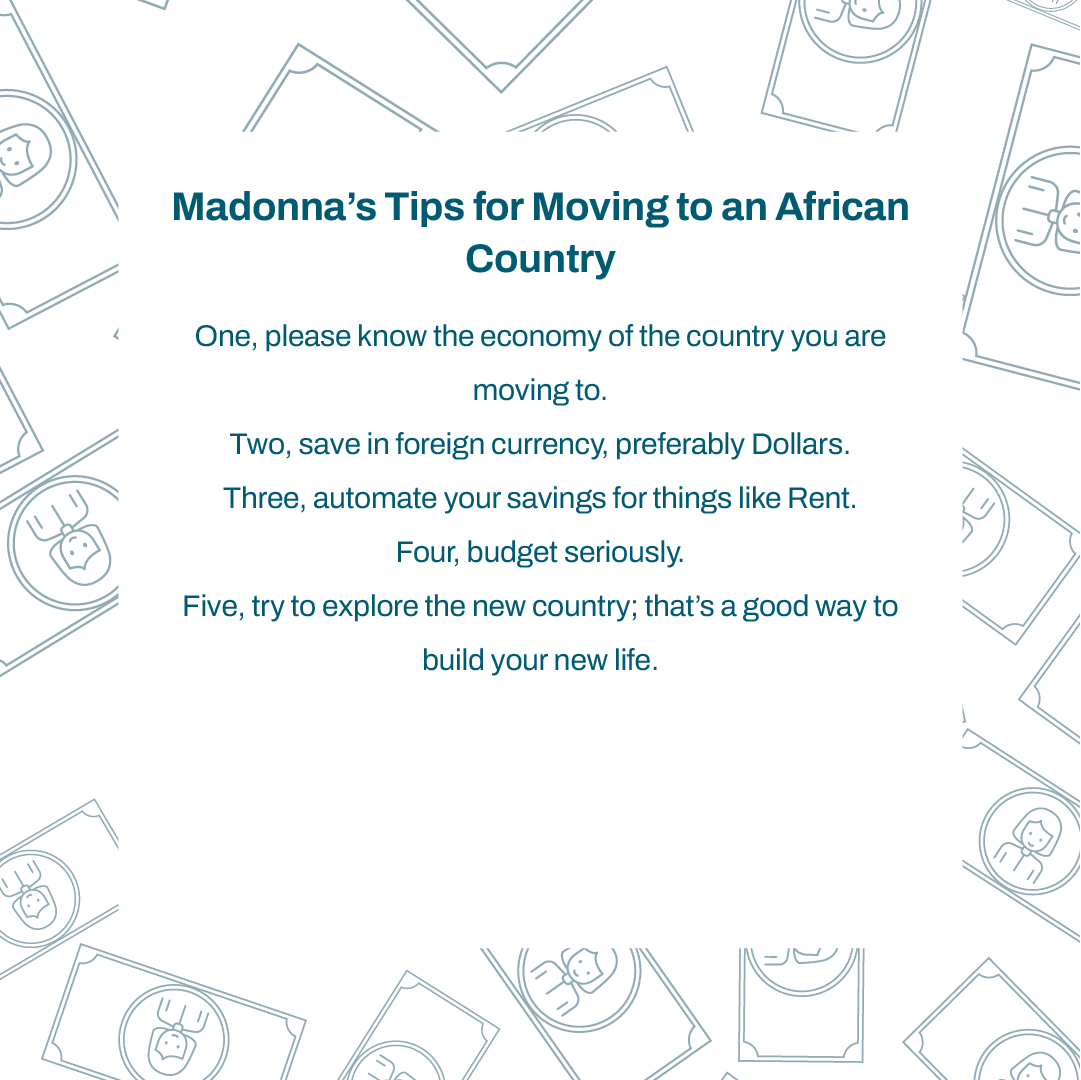Nigeria to Gambia -The Real Cost of Moving and Living
In this episode, Madonna breaks down the cost of relocating from Nigeria to Gambia and how much it costs to live in The Gambia.


What is your name, and what do you do that gives you money?
My name is Madonna Dinebari Badom, and what gives me money right now is my banking job and some volunteer work I do.
Can you give me a range of how much you earn?
Let me bring out my calculator. Right now, I earn 22,000 Dalasis from my bank job, which is about ₦440,000/$238.
Dalasis? That’s the Gambian currency, yeah?
Yes.
You’re Nigerian; how did you end up in Gambia?
I got fed up and booked a one-way flight in 2022 to The Gambia to try my luck.
Why Gambia?
My main plan was just to leave Calabar, either by moving to Abuja or a new country.
Luckily, my friend lived in Gambia and encouraged me to come over. I packed up my suitcase, CV, flight money, and savings of about ₦750k and left.
I didn't have a job in Nigeria at the time, and even when I got to Gambia in April, I didn't get a job until November of that year.
I should mention that my backup plan was to move back to Nigeria if I didn't get a job after six months. But it turned out okay. I got a job, and I fell in love with the country and its beaches.

Can you give me an estimate of how much it cost for you to move from Nigeria to Gambia?
I remember flying from Calabar to Lagos first, which cost around ₦50k, and then the flight cost ₦224k from Lagos to Banjul. That ₦50k pained me because just some months back, I paid ₦44k to and fro for a wedding in Abuja.
Now, I look at Nigerian flight prices and just shake my head.
What was the process of moving from Nigeria to Gambia?
I already had my international passport because I had to travel to Kenya for work the previous year.
Gambia is an ECOWAS country, so it’s visa-free for Nigerians. You can even travel with an ECOWAS passport if you don't have an international passport.
All I needed to do was present my passport at immigration.
They stamped it, told me welcome to the Gambia, and that was it.
Interesting. The Gambia just went up on my list of African countries. Now, let's get into your living expenses. Can you break down what you spend on?
With my salary, I am considered a middle-class earner. The minimum wage here is quite low.
Rent takes up most of my money.
In The Gambia, rent is paid monthly, but you can agree with your landlord to pay for three or six months. I pay 4000 dalasis monthly, but I have an agreement with my landlord to pay my rent every six months. So, I keep my rent aside from my salary every month so that I am not scrambling to look for 24,000 dalasis every six months.
On a normal day, I pay 50 dalasi daily for transport to my office. In a week, I spend 250 dalasis, or 300 when I work on Saturdays.
Then feeding, that one takes my money a lot.
Vegetables are quite cheap here, but when you are looking for things like yams that aren't grown here, they're quite expensive.
I buy beverages and things like Indomie and spaghetti every two weeks and spend no less than 3000 dalasis.
If it's a month when I cook soup or stew, I spend like 2000 dalasis cooking a pot of soup or stew for a month.
A month??
(Laughs) Yeah. I don’t eat that much!
Okay, let me give you an example to break it down. The last time I cooked, Efo Riro, I bought vegetables for 100 dalasis, fish for 200 dalasis, meat for 400 dalasis, palm oil for 50 dalasis, and cowskin (ponmo) for 100 dalasis. Then crayfish, Maggi, salt, and pepper for 200 dalasis.
And that pot of Efo Riro I cooked lasted for nearly a month.
Okay, fair enough. What else do you spend on?
I love rice, but I haven't bought it in a while since my office gave me a bag of it in December.
Plantain is expensive here because it is imported, so if I cook a plantain meal, I spend at least 500 dalasis. Yam is also expensive here. I buy 1 kilo for 125 dalasis. Potatoes are so cheap here, but I am not a big fan of them, so I typically always buy Yam.
Right now, a major thing that takes my money is my online Master's program. Every month, I put aside 6500 dalasis in savings for my fees.
Finally, black tax - I spend at least 1500 - 2000 dalasis every month.
At the end of the month, I barely have savings. I used to have savings, but I used them to pay for my Master’s program. Once I finish my Master's degree, I will build my savings back up.
I am curious. What are you studying?
I am studying leadership and education at Liverpool John Moore’s University. I am doing it under the UNICAF 71% scholarship, which makes my fees affordable.

Good luck with your studies!
Let’s go back for a bit. You mentioned Black Tax. That’s a common topic amongst many young and even older African adults. What boundaries do you put in place, if any, to manage the strain of black tax on your finances?
For me, It is easier to manage because my two elder siblings supplement a lot of the tax.
I am mostly concerned about my niece and my aged dad. Every month, I put aside 1000 dalasis, convert it to Naira, and keep it in my account in case they need anything. I also give my niece a monthly allowance for transportation since she is currently in university.
I see it as good that I can help. Thankfully, my family understands I don’t have much to spare, especially now that I am studying for my Master's Degree. I haven't been able to be so free with money, so they appreciate what little I send home.
When it comes to the black tax, I think I am doing okay.
Now, if you ask my elder sister, she might have a different answer.
I might have to get her to do an interview.
Do you have any side hustles or part-time work that brings in extra income besides your main job?
I used to do freelance writing, but I have not had a gig in a long time.
Well, juggling school and work is hard enough. So, I do not want any gig that will stress me out unless it brings a truckload of money.
I am trying to get back into volunteering and writing for grants. If you write for a grant and it gets accepted, you get paid for it.
I am also considering importing things like hair, clothes, etc., from Nigeria to sell to Nigerians here in Gambia. But inflation keeps stopping my plans because the Naira is so weak.
For now, though, my money plan is to increase my income by getting a better job or a promotion.
I am a corporate and academic girl at heart. Entrepreneurship is not for me. That’s another reason for my Master's Degree: to improve my corporate ladder-climbing chances.
Points for self-awareness!
So, how long did it take to adjust from Nigeria’s economic system to Gambia’s?
I made a very big money mistake when I first came here. I had Dollars, and the exchange rate back then was $1 to 50 dalasi.
Instead of saving that money, I felt I had too much money and spent recklessly.
It didn't hit me until I had to settle down when I realised I had messed up.
Now, I am trying to build up my dollar savings.
That aside, it was quite easy to adjust to the Gambian economy.
For example, transport could cost as low as 10 dalasis. I thought, "Wow, this is much cheaper than paying for transport in Nigeria."
Because the economy was cheaper, I could buy many things in smaller denominations than I was used to.
But at the end of the day, if you calculate it in Naira, it adds up. I had to tell myself to stop calculating in Naira so I wouldn't give myself a heart attack.
What’s the Gambian economy like generally?
Inflation is hitting us here, oh.
When I first came in 2022, it was 50 dalasis to $1, but now it is about 68 dalasis to $1.
The Gambian economy is very dependent on Tourism. Seafood is also a major export, and agriculture is very big here, so food is cheap.
But if you enter a supermarket, half the items on the shelf are imported from Morocco, Nigeria, Lebanon, and India (because we have many nationals here).
Entrepreneurship is also big here.
Finally, do you have any money tips for moving to another African country?
One, please know the economy of the country you are moving to.
Two, save in foreign currency, preferably Dollars.
Three, automate your savings for things like Rent.
Four, budget seriously.
Five, try to explore the new country; that’s a good way to build your new life.




